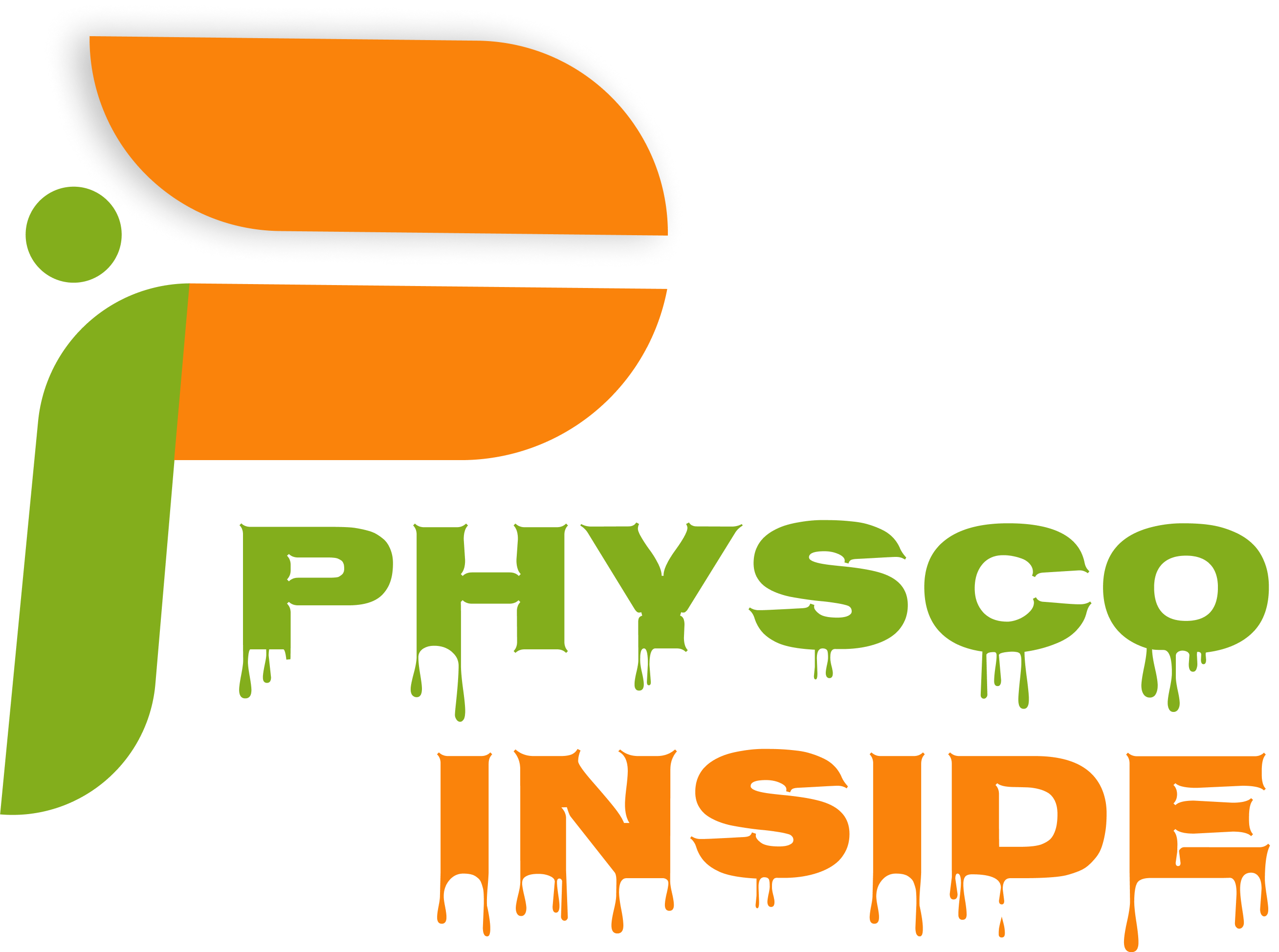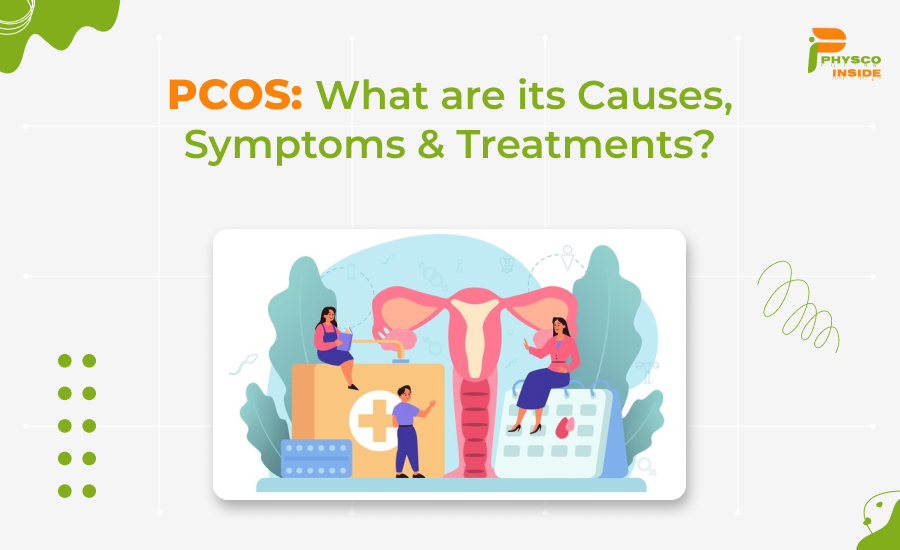What is PCOS?
The Full form of PCOS is Polycystic Ovarian Syndrome. It is a usually Hormonal Disorder found mostly in Females during their Reproductive Years. A woman’s peak reproductive years are between the late teens and late 20s. By age 30, Fertility (the ability to get pregnant) starts to decline. This decline happens faster once you reach your mid-30s. By 45, Fertility has declined so much that getting pregnant naturally is Unlikely. It can cause a range of symptoms and may have long-term health Implications.
What are the Causes of PCOS?
The specific reason isn’t surely known, yet including a mix of Hereditary and natural factors is accepted. A few potential Contributing elements include:
(1) Hormonal Imbalance
PCOS is related to an imbalance in sex Hormones, mainly an increase in Androgens (male hormones) such as testosterone. Raised Androgen levels directly disturb the normal Menstrual Cycle and lead to the development of cysts or sacs within the Reproductive Tract (on the ovaries) of Females.
(2) Insulin Resistance
Insulin is a hormone that is secreted by Beta Cells of the Pancreas. it helps to Regulate the blood sugar level of the body. Insulin resistance happens when the body’s cells don’t respond properly to insulin, the body commands to Pancreas to secrete more Insulin due to which its level gets Increased. So This can Contribute to the development of PCOS.
(3) Genetics
PCOS has a strong Relation with Genes as it is also a strong cause of PCOS. If your mother or sister is affected by PCOS, then Your chances of getting PCOS become higher. So if you have any case in your family, you must pay attention to your Medical Examination.
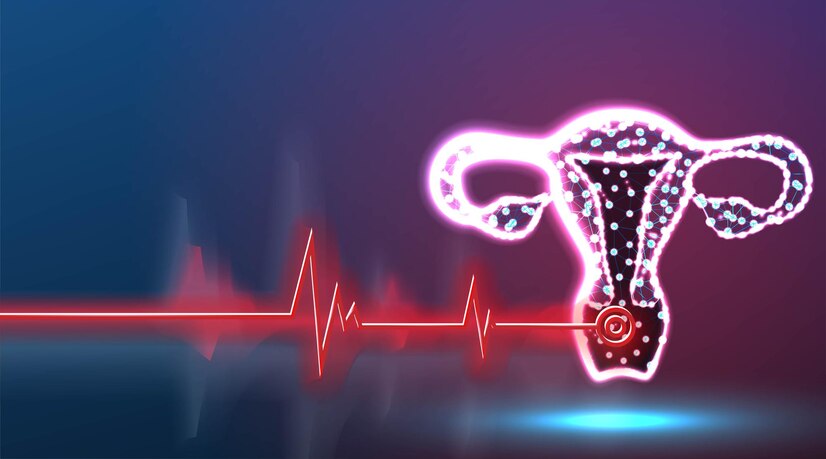
What are the Effects of PCOS:
PCOS can have various effects on the body, both Reproductive and Metabolic. Some potential effects include:
What are the Symptoms of PCOS?
Common Symptoms of PCOS include:
Diagnosis and Management Classically involve an Arrangement of Medical History, Physical Examination, and Laboratory Tests. Treatment may include Lifestyle Modifications, medications to Regulate Hormones, and Addressing specific Symptoms or Concerns.
How Does Screening and Evaluation of PCOS Occur?
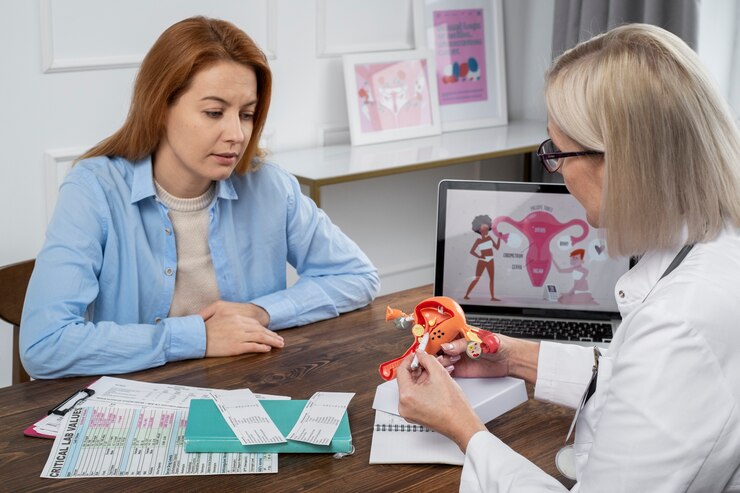
(1) Medical History and Physical Examination:
For better results, it is recommended to have a meeting with your Healthcare Provider. He/she will ask about your Detailed Medical History, including Menstrual patterns, Symptoms, and Family history
(2) Blood Tests:
(3) Pelvic Ultrasound:
This is a technique in which an expert will examine the anatomy of the pelvic region with the insertion of nano Gadgets. Transvaginal Ultrasound can help visualize the ovaries and identify the presence of cysts or Follicles.
(4) Other Tests:
What are the Treatments for PCOS?
(1) Lifestyle Modifications:
Lifestyle Modifications are basic treatments for PCOS. it helps manage symptoms and improve overall health. Regular exercise supports weight management, reduces insulin resistance, and lowers Androgen levels. A Balanced diet aiming at Whole foods, Fiber, and Healthy fats Stabilizes Blood sugar and hormone levels. Stress Reduction methods like Meditation or yoga can lessen Stress-related symptoms. Combined, these changes can regulate Menstrual cycles, enhance Fertility, and reduce long-term health risks associated with it.
(2) Medications:
(2.1) Hormonal Regulation
Drugs like Anti-Conception medication pills manage Monthly cycles, lessen Androgen levels, and lessen side effects, for example, Skin inflammation and Hirsutism by restoring Hormonal balance.
(2.2) Insulin Sensitizers
Metformin further develops Insulin Sensitivity, Assisting with bringing down insulin levels and Decreasing the risk of developing type 2 Diabetes. It likewise helps with Regulating the Menstrual cycle and advancing Ovulation.
(2.3) Anti-Androgen Drugs
Spironolactone and flutamide block the impacts of Androgens, Decreasing side effects like Skin Breakout and Unnecessary hair development (hirsutism).
(2.4) Fertility Medications
Clomiphene citrate or Letrozole stimulates Ovulation in Females attempting to imagine by controlling hormone levels and advancing Egg discharge.
(2.5) Gonadotropins
Infusions of Follicle-Stimulating Hormone (FSH) and luteinizing hormone(LH) can trigger Ovulation in Females impervious to other Fertility medicines.
These Medications address various parts of PCOS, Focusing on side effects and basic Hormonal irregular characteristics to work on general health and Fertility.
(3) Fertility Treatments:
(3.1) Ovulation Induction
Fertility meds like clomiphene citrate or letrozole stimulate Ovulation, assisting PCOS patients with Conception.
(3.2) In vitro Fertilization (IVF)
IVF includes Recovering Eggs from the Ovaries, treating them with Sperm in a lab, and moving coming about undeveloped Organisms into the Uterus, bypassing ovulation issues.
(3.3) Gonadotropin Therapy
Injectable Hormones (Gonadotropins) stimulate Ovulation in females who don’t respond to oral drugs.
(3.4) Surgery (Ovarian Drilling)
Laparoscopic ovarian Drilling includes Penetrating the Ovaries with a laser or needle to reduce Androgen creation and stimulate Ovulation.
(4) Weight Management:
(4.1) Improvement of Insulin Sensitivity
Maintaining a Healthy weight through diet and exercise improves Insulin Sensitivity, reducing hyperinsulinemia, a Common Feature of PCOS. This can help Regulate Menstrual cycles and lessen Androgen levels.
(4.2) Weight Loss as a Treatment Strategy
Excess weight impairs PCOS Symptoms by increasing insulin resistance and Hormonal Imbalances. Weight loss can improve Menstrual irregularities, Fertility, and Metabolic Indicators.
(4.3) Enhanced Fertility
Weight management can increase the Probability of Ovulation, improving Fertility in Women with PCOS. Even Diffident weight loss can have significant benefits for Reproductive results.
(4.4) Long-Term Health Benefits
Beyond symptom management, weight management reduces the risk of long-term difficulties associated with PCOS, such as type 2 Diabetes and CVDs.
(4.5) Reduction of Androgen Levels
Weight loss can lower androgen levels, reducing symptoms like hirsutism and acne. This is particularly significant as high androgen levels subsidize its signs.
(5) Psychotherapy:
This technique plays its role in PCOS due to the following parameters:
(5.1) Stress Reduction
Methods like Cognitive-Behavioral Therapy (CBT) Contribute to Reducing stress levels, which can improve Hormonal Imbalances and symptoms.
(5.2) Lifestyle Modification
Psychotherapy helps in the development of Healthy Lifestyle changes, including diet and exercise loyalty, vital for Managing PCOS-related symptoms.
(5.3) Mental Health
Psychotherapy helps achieve Anxiety, Depression, and Body shape concerns often Associated with PCOS, Improving overall health.
(5.4) Improving Self-Esteem
Therapy indorses Self-acceptance and Self-esteem, Empowering individuals to direct challenges Associated with PCOS with confidence and Flexibility.
(5.5) Managing Strategies
Therapeutic Mediations equip Individuals with effective Management Mechanisms to deal with the emotional peak of PCOS symptoms.
(6) Hair Removal Methods:
(6.1) Symptom Management
Excessive Hair development (hirsutism) is a typical symptom because of raised Androgens. Hair removal techniques like shaving, Waxing, stringing, and laser treatment assist with dealing with this side effect.
(6.2) Personal Confidence
PCOS-related hirsutism can cause trouble and bring down confidence. Powerful hair removal can further develop certainty and mental prosperity.
(6.3) Upgrading Personal Satisfaction
By decreasing apparent indications of hyperandrogenism, hair removal strategies add to better personal satisfaction for people with PCOS, facilitating social and inner difficulties related to the condition.
(6.4) Complementary to Medical Treatments
While not tending to the fundamental hormonal inequality, hair removal complements clinical medicines like hormonal contraceptives or anti-androgen meds in managing side effects comprehensively.
(6.5) Long-term Management
Ordinary utilization of hair removal techniques guarantees continuous administration of hirsutism, supporting people in keeping up with their ideal appearance and managing its side effects effectively.
(7) Surgery:
Surgery is considered for Polycystic Ovary Condition (PCOS) when prescriptions and way of life change neglect to oversee side effects, especially in cases of extreme infertility or complications.
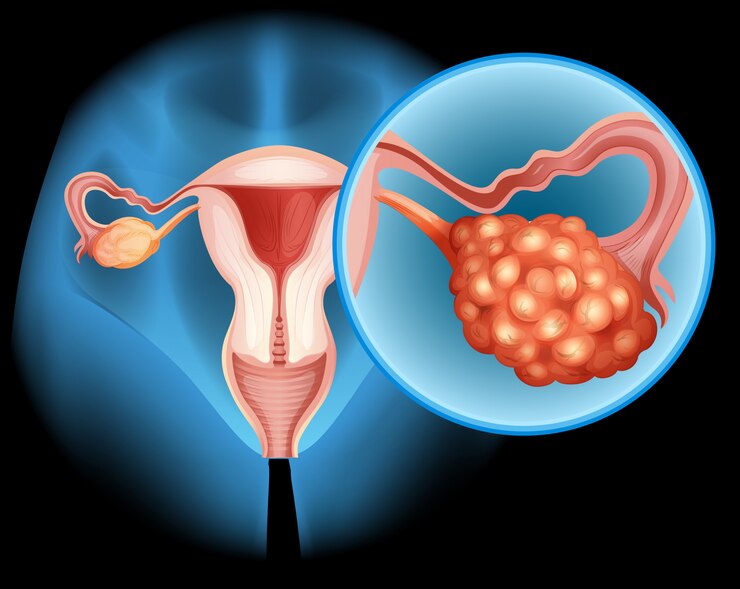
Ovarian Drilling
Oophorectomy
Surgery for PCOS is a final option, saved for serious situations where different therapies have failed or when obvious confusions emerge, with likely advantages yet in addition huge dangers and suggestions.
Conclusion
All in all, PCOS is a complex Hormonal problem with broad impacts on ladies’ well-being. Its causes are multi-layered, including hereditary, ecological, and lifestyle factors. Observing the side effects early is pivotal for suitable intervention and management. While treatments vary and often include medication, way of life changes, for example, diet and exercise assume a huge part in reducing side effects and working on general personal satisfaction for those living with PCOS.
FQS about Polycystic Ovarian Syndrome
Answer: Yes, many women with PCOS can conceive with appropriate treatment and lifestyle changes, such as medication to induce ovulation or assisted reproductive technologies
Answer: PCOD symptoms include irregular periods, excessive hair growth, acne, weight gain, and difficulty conceiving due to hormonal imbalances affecting ovaries.
Insulin-resistant PCOS. (most common)
Inflammatory PCOS.
Post-pill PCOS.
Adrenal PCOS.
Answer: Its treatment typically involves lifestyle modifications (diet, exercise), hormonal contraceptives, metformin, and sometimes fertility medications or surgery, tailored to individual needs
Answer: It cannot be “cured” permanently, but symptoms can be managed through lifestyle changes, medication, and sometimes surgical intervention, under medical supervision.
Answer: In PCOD the ovaries start releasing immature eggs that lead to hormonal imbalances and swollen ovaries, among other symptoms; while in PCOS, endocrine issues cause the ovaries to produce excess androgens, which makes eggs prone to become cysts.
